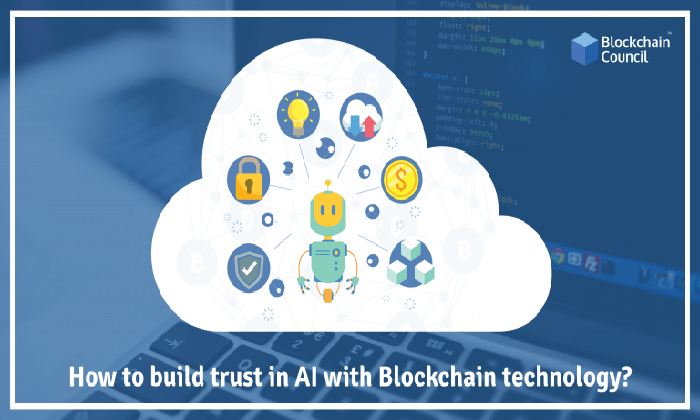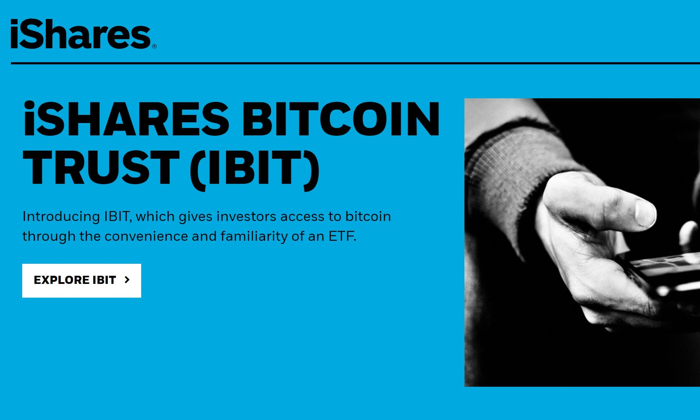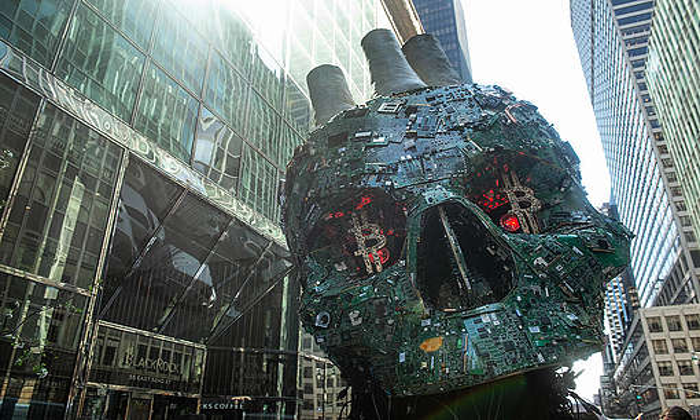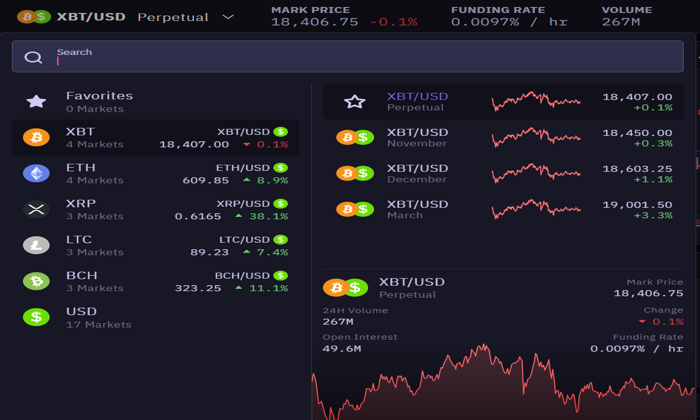In the rapidly evolving landscape of technology, **Blockchain for AI trust** emerges as a critical solution to the growing demand for transparency and reliability in artificial intelligence systems. As AI relies heavily on vast datasets, the integrity and traceability of this data become paramount for ethical AI practices. Integrating blockchain technology into AI not only ensures data traceability but also enhances AI data integrity and facilitates the development of trustworthy AI frameworks. With its inherent qualities of immutability and verifiability, blockchain helps address the legal and ethical dilemmas that continue to plague the AI industry. Hence, adopting blockchain for AI systems paves the way for scalable and responsible innovation in this digital age.
Exploring the intersection of distributed ledger technology and artificial intelligence can shed light on the burgeoning concept of secure AI ecosystems. Blockchain, the backbone of cryptocurrencies, offers a robust infrastructure that is essential for fostering reliable machine learning applications. By ensuring meticulous data provenance and upholding ethical data practices, this innovative technology safeguards against the challenges of data decay and non-compliance in AI models. Moreover, the ability to create accountable and transparent data transactions is vital for building public trust in machine learning systems. This convergence of advanced technologies represents a pivotal moment for creating a future where intelligent systems can be both efficient and ethically aligned.
The Essential Role of Data Traceability in AI
Data traceability is an integral feature that enhances the reliability of AI systems. In the realm of ethical AI, being able to track the origin of each dataset is crucial to ensure that the data used in training algorithms is both accurate and lawful. This capability not only assists organizations in maintaining compliance with regulations but also supports transparency. By implementing blockchain technology, AI developers can create a verifiable history of data lineage that assures stakeholders of the ethical considerations made during the data collection and processing stages. Thus, traceability serves as the backbone of trust, allowing AI models to operate with a foundation of integrity.
Moreover, when data is traceable, it facilitates accountability. Each source of information can be scrutinized, thereby deterring unethical data gathering practices. In today’s data landscape, where allegations of manipulation and bias are rampant, traceability empowers businesses to defend their datasets against scrutiny. By ensuring that data handling respects both legal and ethical standards, companies can foster a more robust relationship with users. Ultimately, the push for high-performance AI necessitates this keen focus on data traceability—because if the origins of data cannot be trusted, the outputs from AI systems will remain questionable.
How Blockchain for AI Trust Revolutionizes Data Integrity
Blockchain holds the potential to transform AI outcomes by ensuring data integrity through its immutable and decentralized nature. By adopting blockchain for AI trust, organizations can embed a level of assurance within their AI systems that is rarely found with conventional data management strategies. Immutability guarantees that data cannot be altered after it is entered, safeguarding against the risks associated with data manipulation. Consequently, this foundational trust helps in building AI applications that are not only more effective but also more reliable. For stakeholders, the assurance that data integrity is maintained illuminates the route forward toward deploying AI in sensitive and critical sectors like healthcare and finance.
Additionally, the verifiability feature inherent in blockchain technology enriches AI data integrity. Each transaction or data entry can be verified independently by all parties involved, promoting a sense of unity and collaboration among data providers. This transparency can significantly reduce the urgency for organizations to engage in secretive or unethical data gathering methods that often lead to legal ramifications. Trustworthy AI products hinge on trustworthy data sources, and by establishing a blockchain-based infrastructure, organizations can underpin their AI frameworks with verifiable data provenance.
Building Trust with Ethical AI and a New Data Economy
In order to construct systems of trustworthy AI, the underpinnings of our data economy must adhere strictly to ethical standards. As we transition to a new data economy driven by consent, it is vital to invoke practices that respect user autonomy. With blockchain’s ability to facilitate consensual data sharing processes, organizations can begin to redefine the relationship users have with their data. By employing methods that ensure transparency regarding how their data will be utilized, organizations stand to benefit from enhanced user loyalty and community trust. Ethical AI cannot thrive in murky waters; clear ethical guidelines must govern every facet of data interaction, from collection to processing.
Moreover, equitable compensation for data contributors is paramount in establishing a trusted data economy. People need to be acknowledged and compensated for the value their information brings to AI models. In a world increasingly concerned with privacy and data rights, organizations can utilize blockchain technology to ensure that individuals who share their data are fairly rewarded. An ethical framework underpinned by fairness and mutual respect not only elevates the data economy but also secures a more robust operation for AI development, demonstrating that ethical considerations and technological advancements can indeed coexist.
The Interplay Between AI, Blockchain, and Data Ethics
AI and blockchain technology conjoin to create a new paradigm in data handling, specifically around the ethics of data use. In a landscape where AI decisions increasingly dictate outcomes in various fields, from financial forecasting to medical diagnostics, the ethical implications cannot be overstated. Blockchain technology provides a robust solution by ensuring that data is collected, stored, and utilized in a manner that respects user privacy and data rights. Establishing clear ethical guidelines within the blockchain framework strengthens the integrity of AI, creating a feedback loop where ethical considerations enhance AI performance and reliability.
Moreover, as transparency emerges as a cornerstone of ethical AI, blockchain creates an invaluable link between accountability and trust. Stakeholders can easily verify the sources and processing pathways of datasets utilized in AI models. This level of verification empowers users and developers alike to hold organizations accountable for their data practices. The intersection of AI, blockchain, and data ethics not only informs best practices in data analytics but also drives innovation in developing autonomous systems that prioritize ethical considerations at every step.
Mitigating Legal Risks with Blockchain for AI Systems
The legal landscape surrounding AI is becoming increasingly complicated as technology evolves. Organizations deploying AI face mounting risks associated with data ownership, intellectual property, and potential legal infractions. Emphasizing blockchain for AI trust can serve as a proactive measure in mitigating these legal challenges. The immutable nature of blockchain not only provides a clear record of data acquisition and usage but also protects against claims of unauthorized data use. In a scenario where ownership of data could be contested, having a transparent lineage established through blockchain records bolsters legal defenses.
Moreover, smart contracts intrinsic to blockchain systems can automate compliance with legal obligations by enforcing terms related to data usage and consent. In this manner, organizations can minimize their legal exposure while also streamlining operational processes. By proactively addressing data governance issues through blockchain, AI developers can concentrate on innovation without fearing the looming threat of lawsuits or regulatory breaches. Hence, blockchain offers a dual benefit—safeguarding companies legally while enhancing the ethical framework underpinning AI technologies.
Enhancing AI Decision-Making with Data Immutability
The reliability of AI decision-making is inextricably linked to the quality of the data upon which it trains. Immutability provided by blockchain ensures that once data is entered, it remains unchanged, thus preserving its original state for future reference. This steadfastness protects against the pitfalls of data alteration and duplication that can skew AI outputs, leading to problematic decision-making in critical areas. By providing a secure foundation where the integrity of data remains intact, blockchain fosters a level of trust among AI applications, cements user confidence, and supports improved outcomes.
Furthermore, immutable records allow for comprehensive auditing of AI processes, providing transparency that is often lacking in traditional AI deployment. Organizations can assess the decisions made by AI systems based on historical data points, thus clarifying the rationale behind outcomes and enabling better governance of AI. As the demand for accuracy and reliability in AI applications accelerates, the need for immutable data will only intensify, further highlighting the necessity of integrating blockchain technology within AI infrastructures.
How Blockchain Empowers Ethical AI Practices
As AI continues to permeate various sectors, the call for ethical AI practices has become more urgent. Blockchain technology presents a viable path forward, enabling organizations to hold themselves accountable for their data practices. By embedding ethical principles into AI development through blockchain frameworks, developers can ensure that their models operate transparently and equitably. With each collected data point traceable back to its source, stakeholders can gain insights into how ethical standards are upheld from data gathering to model application.
Moreover, the facilitation of consent through smart contracts credits users for their contributions, allowing data contributors to have more control over their information. Empowering individuals in this way not only fosters goodwill but encourages more informed participation in data-sharing initiatives. This synchronicity between blockchain technology and ethical AI practices accentuates the role of trust in enhancing the overall performance and reputation of AI systems, thus fulfilling the demand for modern AI to be responsible and ethical.
The Future of AI and Blockchain Collaboration
The synergy between AI and blockchain technology heralds a promising future filled with opportunities for growth and innovation. As AI systems become more intertwined with everyday life, the complexities surrounding data quality and ethical usage will continue to multiply. By embracing blockchain solutions, organizations can pave the way for AI that not only operates efficiently but also upholds the highest ethical standards. This spirit of collaboration will be essential as organizations strive for competitive advantage in a market increasingly focused on responsible data practices.
Furthermore, the future landscape hinges on the maturity of both technologies. As blockchain technology becomes further integrated into AI frameworks, we can expect to see more sophisticated solutions that harness the strengths of both fields. From better transparency and audit trails to elevated data integrity, the potential for improving AI applications is immense. Embracing this collaboration will allow industries to better navigate legal, ethical, and technical challenges while harnessing the massive potential of AI for societal advancement.
Frequently Asked Questions
What role does blockchain technology play in ensuring AI data integrity?
Blockchain technology is pivotal for ensuring AI data integrity as it provides a decentralized and immutable ledger for data transactions. This means that once data is recorded on the blockchain, it cannot be altered or tampered with, thereby enhancing AI’s reliance on trustworthy data sources. The traceability aspect of blockchain allows for the verification of data origins, ensuring that AI systems are trained on high-quality and ethical datasets.
How can blockchain enhance trust in ethical AI applications?
Blockchain enhances trust in ethical AI applications by ensuring that the data used for training AI models is both verifiable and transparent. With features like smart contracts, AI developers can automate consent and compensation for data usage, thereby fostering a responsible data economy. This trustworthiness is essential for AI systems that impact critical sectors like finance, healthcare, and law.
What is data traceability and why is it essential for AI?
Data traceability refers to the ability to track and verify the origins and history of datasets. It is essential for AI because it helps prevent the use of unreliable or biased data, which can lead to flawed decision-making. By leveraging blockchain’s traceability capabilities, AI developers can ensure that the data used is both ethical and high-quality, ultimately increasing the overall trust in AI systems.
How does blockchain technology address the issue of data decay in AI?
Blockchain technology addresses the issue of data decay in AI by providing a secure and immutable record of data inputs. By ensuring that only verified and high-integrity data is used to train AI models, blockchain helps maintain the reliability of the information over time, reducing the risks associated with ‘data decay’ and ensuring AI systems remain accurate and effective.
What challenges do AI developers face concerning data provenance, and how can blockchain help?
AI developers often face significant challenges regarding data provenance, including the opacity and unreliability of data sources. Blockchain technology can help by creating a transparent ledger that documents the entire lifecycle of datasets, from collection to usage, thus enabling developers to ascertain the trustworthiness of the data they are using for AI training.
Can blockchain help mitigate legal risks associated with AI and data usage?
Yes, blockchain can help mitigate legal risks associated with AI and data usage by establishing a clear and verifiable record of data consent and usage rights. Smart contracts can automate agreements regarding data use, making it easier to comply with regulations and avoid potential lawsuits, thus protecting organizations from legal liabilities.
Why is trustworthy AI considered a necessity for modern applications?
Trustworthy AI is considered a necessity for modern applications because it relies on high-integrity, ethically sourced data. With increasing public scrutiny and regulatory pressures, AI systems must be built on trustworthy foundations that ensure ethical data usage and accurate outputs, essential for making critical decisions in areas like healthcare and finance.
In what ways can the integration of blockchain technology transform the AI data economy?
The integration of blockchain technology can transform the AI data economy by enabling consensual data collection and compensation models. This shifts the data economy toward transparency and fairness, allowing individuals to receive equitable compensation for their contributions while ensuring that data is ethically sourced and traceable, ultimately benefiting the development of responsible AI.
How does the combination of AI and blockchain improve performance and reliability?
The combination of AI and blockchain improves performance and reliability through enhanced data integrity and traceability. By securing data on a blockchain, AI models are trained on verified, high-quality datasets that reduce inaccuracies and biases. This leads to improved model performance, fewer errors, and greater trust from users.
What future developments can we expect in blockchain for AI trust?
Future developments in blockchain for AI trust may include advancements in data governance frameworks, further integrations with smart contracts for automated compliance, and the rise of decentralized data marketplaces. These innovations will likely enhance the traceability, transparency, and ethical grounding of AI systems, fostering greater public trust and engagement.
| Key Point | Explanation |
|---|---|
| AI’s Dependency on Trustworthy Data | AI systems cannot scale effectively without a reliable and ethical data foundation, making data integrity crucial for performance. |
| The Challenge of Untrustworthy Data | Data used in AI is often unreliable and poses legal implications. Models based on unethical data are prone to inaccuracies and biases, leading to significant operational and financial risks. |
| Blockchain as a Solution | Blockchain offers essential features—traceability, immutability, and verifiability—that can address the data crisis in AI, ensuring data quality and consent throughout. |
| A New Data Economy | Transitioning to a data economy that emphasizes consent, fair compensation for data contributions, and accountability can mitigate ethical and operational challenges in AI. |
| The Importance of Clean Data | High-quality data management directly influences AI performance. Leveraging blockchain can lead to reduced retraining cycles and environmental costs associated with inefficient data usage. |
Summary
Blockchain for AI trust is vital for ensuring that AI systems can operate effectively in the modern data landscape. Trust is fundamentally built on the integrity of data sources; thus, using blockchain technology can provide the necessary transparency and accountability required for ethical AI development. As AI continues to shape industries, embracing blockchain can not only enhance the reliability of AI decision-making but also pave the way towards a more ethical and equitable data economy.
In the rapidly evolving landscape of technology, **Blockchain for AI trust** emerges as a pivotal solution to enhance data reliability and ethical practices within artificial intelligence. As AI applications proliferate, the quest for data integrity becomes paramount; blockchain technology offers immutable records and unparalleled data traceability to foster confidence in AI systems. This innovative infrastructure ensures that AI frameworks can reliably access ethically sourced data, significantly boosting their operational performance. By addressing the issues of data provenance and consent, blockchain creates a pathway toward a more trustworthy AI ecosystem where users can feel secure in their interactions with intelligent systems. Leveraging such technology not only establishes the groundwork for ethical AI but also helps mitigate potential legal complications surrounding data use.
In today’s digital age, the intersection of distributed ledger systems and artificial intelligence plays a crucial role in building trust and accountability. The synergy between blockchain and trustworthy AI manifests through enhanced data validation, transparency in data sources, and the ethical utilization of AI assets. With principles of responsible data management, organizations can harness the benefits of decentralization to create a secure, verifiable framework that supports ethical AI development. As interest in AI and blockchain continues to grow, embracing these technologies will be essential for fostering innovation that prioritizes the integrity of data and the ethical standards of AI-driven applications. By doing so, we pave the way for a future where reliable AI can operate within a defined, trusted data ecosystem.















